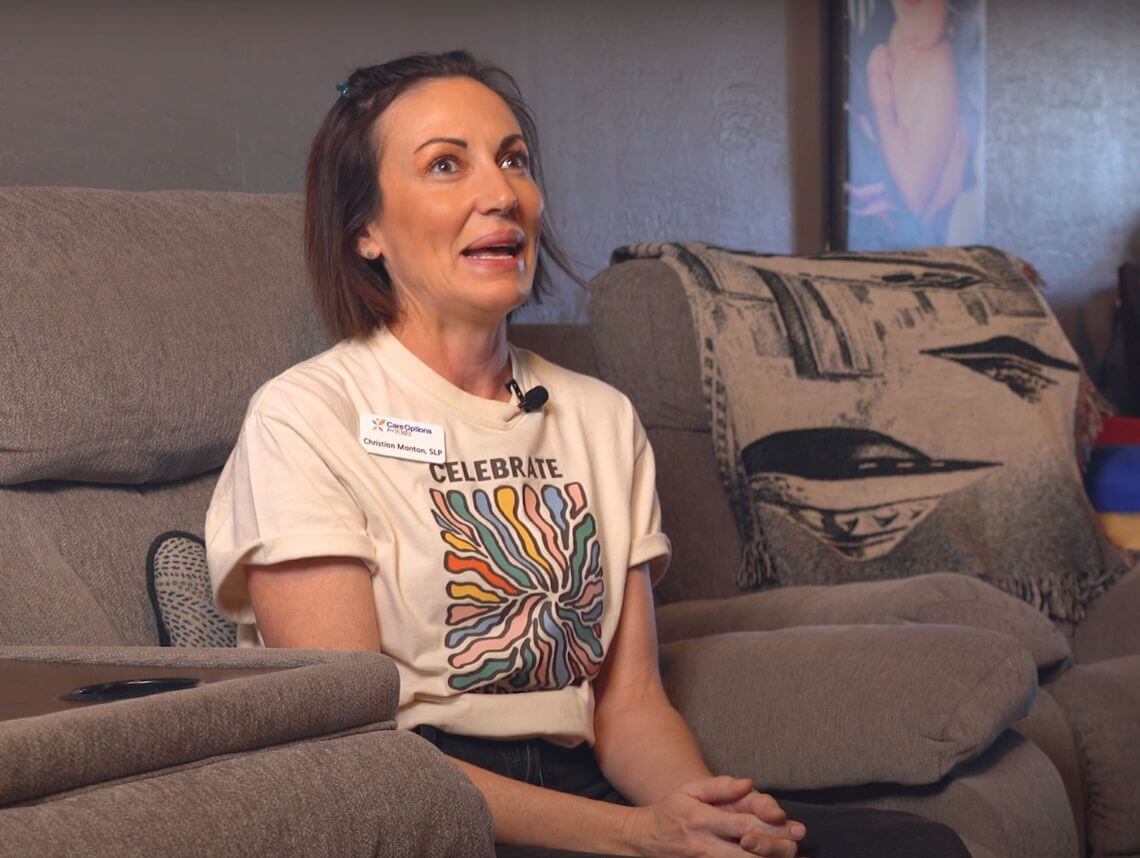Solace Blog
- Activities19
- Autism & Behavioral4
- Community154
- Early Intervention71
- Events & Giving Back20
- Extraordinary Kids22
- Family Caregiver4
- Home Care Therapy60
- News93
- Parent Articles83
- Patient Testimonial21
- Pediatric Therapy76
- Pediatric Therapy Career46
- Private Duty Nursing1
- School-Based Services1
- Telehealth Therapy27
- Tips & Advice66
Sensory Activities For Kids

From School To Home: Christian’s Shift To Impactful Therapy
Speak, Listen, Connect: 6 Communication Strategies for Therapists
Your 5-Minute Mindfulness Break: 5 Simple Ways to Recharge Between Therapy Sessions
The Transformative Power of Occupational Therapy: Peter Leypold’s Journey

Arizona Teen Diagnosed With Spastic Diplegia Cerebral Palsy Now Walking Independently
At two-years-old Blake was diagnosed with spastic diplegia cerebral palsy and underwent major surgery called bilateral distal femural extension ostemotomy. The surgery was performed to increase the ability of the knees to straighten and to improve his gait.
Spastic diplegia cerebral palsy is one of three different types of spastic cerebral palsy. The most common problem with the disorder is muscle stiffness. It occurs during infancy and early childhood, with the average age of diagnosis being three-years-old.
Some children with spastic diplegia cerebral palsy also have problems with coordination and balance, seizures, joint contractures and cognitive impairment, which can range in severity. Other symptoms include:
- Toe walking
- Flexed knees
- Late motor milestones, including walking delayed until age two to four
Most children with cerebral palsy benefit from physical therapy, which is especially true for children with spastic diplegia. Physical therapy can help loosen stiff muscles, help with balance and posture issues, and build stamina and strength.
Blake’s Plan of Care
Blake started treatment sessions with Solace Pediatric Healthcare (formerly Nelson Pediatric Healthcare) in 2017. His balance and strength were his primary challenges so the plan of care was to gain strength to walk independently, and incorporate several core stretching and strength training exercises.
“Blake is a really cool kid who has overcome so many challenges. He is never negative about what he can’t do, only eager to do and get better,” said Robyn, physical therapist with Solace Pediatric Healthcare.

“My approach with his mom/family has been super collaborative and we have worked on multiple skills, including getting into/out of either parents car, ascending/descending stairs with less support, stepping into/out of a tent, and skills to set him up to eventually live on his own one day,” added Robyn.
“Blake did lots of exercises, including walking on a treadmill, sit to stand, wall sits, balance exercises, jumping jacks, sit ups, hip exercises, bear crawls and stairs. He was always doing something new,” said Debbi, Blake’s mother.
“My husband or I were always involved in therapy by participating or giving ideas on what was working or what he was struggling with and how we can fix it. Our therapists were very attentive and caring. They were available to talk anytime, and to listen to all our concerns and incorporate all ideas into his care, ” added Debbi.
Blake’s Progress to Date
Blake has come a long long way since he began treatment sessions. Now 17-years-old, Blake is doing very well. He is able to walk several miles independently with no crouched knees, and without getting tired.
Prior to therapy, he was in a crouched standing position and required a wheelchair for long distances. Camping and playing basketball are two of his favorite activities. He enjoys camping trips with his dad and brothers, and over the course of four years, he has gone from needing to be carried on some walk/hikes, to hand hold assist, to intermittent support for balance.

“Blake is really fun to work with because he is always up for a challenge and will continue to push himself to really get better. Watching him grow through his teen years has been really fun. He’s beginning to come out of his shell, and banters a bit about various sports since we don’t root for the same teams,” adds Robyn.
“We are so happy with therapy and how far Blake has come. Everyone has been friendly and helpful.”
How to Refer Your Child
Solace Pediatric Healthcare is proud to be a part of the Care Options for Kids Community, the leading provider of pediatric nursing, family caregiver, occupational, physical, speech, and feeding therapy services. Since 2005, our clinicians have provided pediatric care to children from birth to 21 years of age. At Care Options for Kids, we’ve instilled a culture built on trust, communication, teamwork, and accountability.
- I want to refer my child for an Evaluation/Therapy. If you know you would like to speak to our patient advocate to discuss scheduling an initial evaluation with a licensed pediatric therapist, simply complete and submit the Referral Form so we may contact you. Please provide as much information on the secure/encrypted form as possible as it is required to begin the process. We do accept Medicaid and most insurances.
- I Want to Be Contacted. If you would like to speak with our patient advocate for more information prior to submitting a Referral Form, simply complete the Contact Me Form and submit.
If you prefer to contact us to discuss your child, please call our team. You can reach us by phone at: (Denver) 303.432.8487; (Colorado Springs) 719.623.5463; (Northern Colorado) 970.775.8476; and (Pueblo) 719.695.4535.
Reference: Cerebral Palsy Guidance

Share this Post